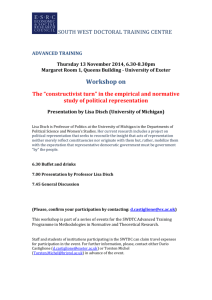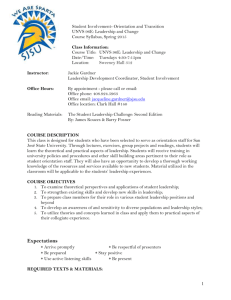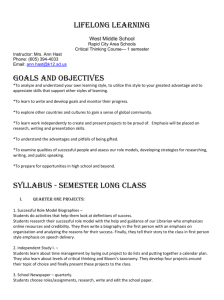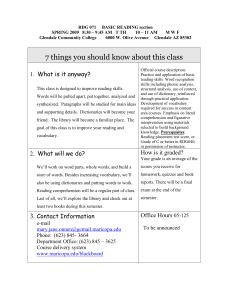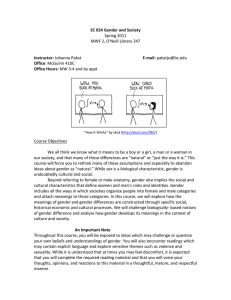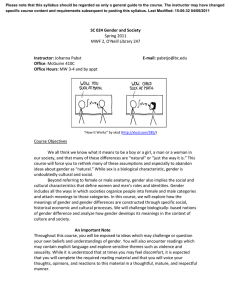PSYC\WOMS - San Jose State University
advertisement
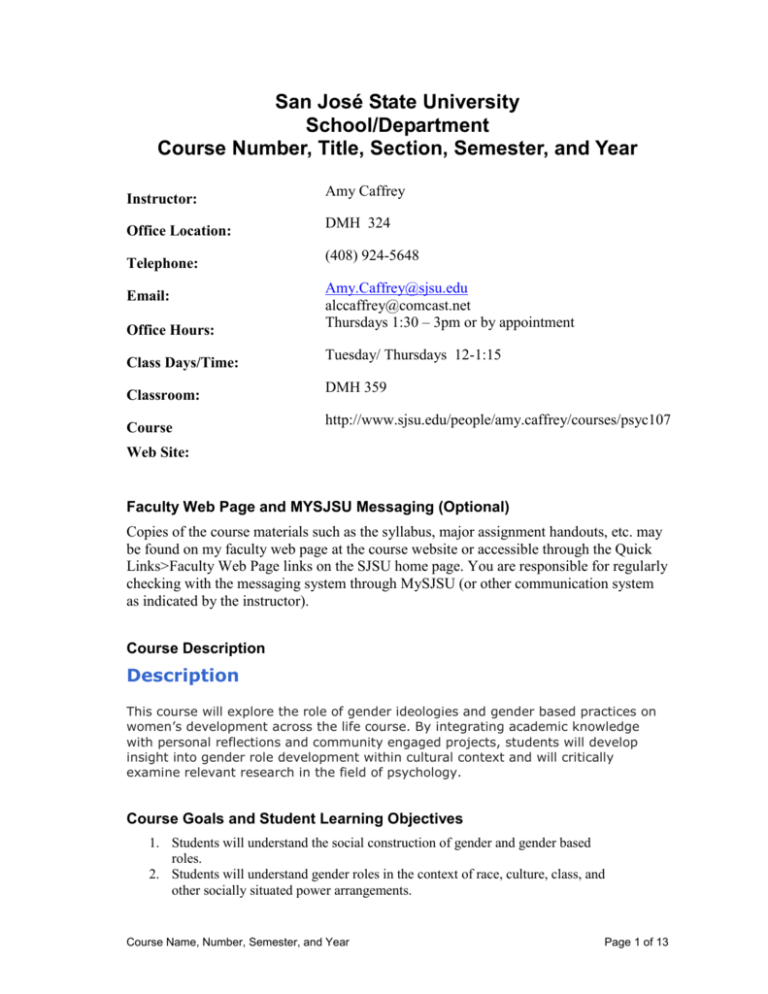
San José State University School/Department Course Number, Title, Section, Semester, and Year Instructor: Office Location: Telephone: Email: Office Hours: Class Days/Time: Classroom: Course Amy Caffrey DMH 324 (408) 924-5648 Amy.Caffrey@sjsu.edu alccaffrey@comcast.net Thursdays 1:30 – 3pm or by appointment Tuesday/ Thursdays 12-1:15 DMH 359 http://www.sjsu.edu/people/amy.caffrey/courses/psyc107 Web Site: Faculty Web Page and MYSJSU Messaging (Optional) Copies of the course materials such as the syllabus, major assignment handouts, etc. may be found on my faculty web page at the course website or accessible through the Quick Links>Faculty Web Page links on the SJSU home page. You are responsible for regularly checking with the messaging system through MySJSU (or other communication system as indicated by the instructor). Course Description Description This course will explore the role of gender ideologies and gender based practices on women’s development across the life course. By integrating academic knowledge with personal reflections and community engaged projects, students will develop insight into gender role development within cultural context and will critically examine relevant research in the field of psychology. Course Goals and Student Learning Objectives 1. Students will understand the social construction of gender and gender based roles. 2. Students will understand gender roles in the context of race, culture, class, and other socially situated power arrangements. Course Name, Number, Semester, and Year Page 1 of 13 3. Students will understand the effects of gender ideology and institutionalized gender roles on female and male psychological functioning, physical health, sexuality, interpersonal relationships, and achievement. 4. Students will use feminist psychological principles to examine and critique research methodologies in the field of psychology. 5. Students will develop critical thinking skills and skills in problem identification. 6. Student will develop the skills to communicate effectively both verbally and in writing. 7. Students will build skills in teamwork and collaboration. 8. Students will build civic engagement and university engagement by using the tools of feminist psychology to address campus/community needs. 9. Required Texts/Readings Textbook Required Readings: 1. Textbook: Crawford, M. & Unger, R. (2004). Women and gender: A feminist psychology. McGraw Hill. 2. Anthology: Disch, E (Ed.) (2009). Reconstructing gender: A multicultural anthology. NY: McGraw Hill. Other Readings (TBA.) Classroom Protocol (You are expected to come on time and to participate actively and attentively in this course. All cell phones must remain on silent during course time. Surfing the web, listening to music and engaging in text messaging during class time are all prohibited. If you are unable to refrain from engaging in disruptive behaviors during class time, you will be asked to leave the class. As part of this course, we will be discussing issues that are very controversial. You will be presented with a variety of thoughts about these topics and it is up to you to decide where you stand on the various issues. There is no single ideology that you must believe in, however, we do require that you support your idea with text and experience (e.g., gender and community project). First and foremost, mutual respect is essential to the success of the class. During class discussion, we will examine whatever ideas are brought up, analyze them, and determine for ourselves what parts are valid and what parts are not valid based on different criteria such as empirical research literature, and personal values. Remember, this examination needs to be done in a context of controversy within civilityWe will not allow people to be disrespectful of other people's ideas. Remember that you will never be graded on your opinion; only how well you support it. Course Name, Number, Semester, and Year Page 2 of 13 Second, effective education is student-centered. This means I will serve as a guide throughout your learning process, but I do not see myself as the sole source of knowledge. Practically, this means that small and large discussion will play a major role in the course. This learning style makes it imperative that you do the readings before class and come in prepared to discuss what you have read. Third, knowledge is obtained in the interactive process of action and reflection. This is why you will be involved in a community education project. Since the goal is for you to become active participants in the discovery of knowledge, you will be integrating ideas that have been generated from the readings and class discussions with ideas that have originated from your community project work..) Course Requirements & Grading: The total points possible for the class is 200. I) Gender & Community Project (100 points total) II) II) 3 Integration Assignments (75 points total) III) III) Participation (25 points) Assignments: Course Name, Number, Semester, and Year Page 3 of 13 I. Gender & Community Project: 100 points The Gender & Community Project is team based cumulative project that is divided into four distinct assignments. The due date of each assignment is noted on the green-sheet. This project is adapted from the work of psychologist, Jennifer Freyd. Three class sessions will be allotted to team project meetings but the bulk of the project work will be done as homework, outside of class time. In this project, you will apply research and theory from the psychology of gender to educate people and/or influence policy change. For instance, you might write a letter that could be sent to a local school board arguing for or against single sex public schools. Or you might create a compelling video, poster, public service announcement, web site, or pamphlet to prevent gender based hate crimes and also draft a letter to appropriate administrators (e.g. a principal, res hall director, CEO) explaining why this media campaign would be effective. Or you might create a brief report for state or national legislators about family leave and child care policy. Your project will be graded on the degree to which you clearly and effectively apply research and theory from the psychology of gender. You must use references from the psychology of gender literature. These references may include articles or chapters from the required course readings. Each team member will be expected to find, read, summarize and use one relevant scientific article from the library. Your project must demonstrate your comprehension of psychological literature related to gender and your ability to apply the scholarly and research information you have read. More details about each part of the Gender and Community Project will be given on the course web site. The Gender and Community Project consists of the following four assignments: 1. Project Plan (10 points): This plan must indicate your educational outreach objectives (what are you trying to teach), your audience (who are you trying to educate), and your final product (e.g. letter, poster, brochure, video, web site. Each team member must provide a citation for a scientific article or book chapter on the psychology of gender that comes from a social science database such as psycinfo (go to: library.sjsu.edu). You will also list team members and their proposed responsibilities for completion of the project. A detailed assignment sheet will be provided on the course web site. 2. Progress Report (20 points): This report will summarize the literature you have read (e.g detail research question, methods, conclusion, implications) and will describe what each team member has learned about the issue. Each team member will report what they have accomplished toward the final product (e.g. created an outline, drafted a web site, started shooting a video, conducted interviews, met with resource people) and will explain how the relevant literature reviewed supports the aims of the project. A detailed assignment sheet will be provided on the course web site. 3. Final Project Report (30 points): This report will include all text from your project (all the words and media that will be included in your web site, pamphlet, video, or other product) and will provide me with the opportunity to make edits and suggestions prior to your team creating your final educational media. The contribution of each member will be listed. A detailed assignment sheet will be provided on the course web site. 4. Final Project Presentation (40 points): All projects will be presented at a Gender and Community Forum held during finals week. All team members must participate in the Course Name, Number, Semester, and Year Page 4 of 13 final presentation in order to receive credit. Over the course of the semester, we will work together to develop the most effective strategy for using your projects to influence change in the context of an educational forum. II. Integration Assignments (75 points) Three integration assignments, worth 25 points each, will provide an opportunity for you to integrate information from course readings and lecture with personal reflection and opinions. Specific integration questions will be provided for each assignment. Each integration assignment will be no more than three pages, double spaced, using a standard 12 point font. I will not accept hand written work. III. Participation (25 points) The purpose of evaluating your participation is to encourage and reward students who demonstrate engaged scholarship. Thus, you will be evaluated on the extent and quality of your participation in class and class related projects. I may periodically distribute in class thought assignments based on the readings that will be considered in evaluating your participation. Your participation grade will be based on the following criteria: Excellence (25 points) requires that you participate fully in the Gender & Community Project, that you respond thoughtfully and clearly to all in class thought assignments, and that you play a leadership role in discussion, demonstrate that you carefully read and thoughtfully consider the text, discuss points articulately, listen sensitively and respond intelligently to other's views; do not interrupt, obstruct or dominate discussion; ask insightful, carefully-constructed questions; and take responsibility for the overall quality of the discussion. Above average (20 points) requires that you participate fully in the Gender & Community Project, that you respond thoughtfully and clearly to all in class thought assignments, and that you participate actively in discussion, demonstrate good knowledge of the text, work to achieve understanding, listen to other viewpoints, and ask sound questions. Average (15 points) requires that you participate fully in the Gender & Community Project, that you respond thoughtfully and clearly to all in class thought assignments, and that you follow the discussion, make occasional comments, have a basic knowledge of the text, and sometimes ask questions. Below average (5 points) requires that you participate fully in the Gender & Community Project, that you provide a clear response to some of the in class thought assignments, and that you occupy a seat and occasionally ask questions in class. Course Name, Number, Semester, and Year Page 5 of 13 At the end of the course, you will be asked to evaluate your level of participation and success in conducting campus/community workshops. This self-evaluation will be taken seriously when participation grades are determined. g and Adding Students are responsible for understanding the policies and procedures about add/drop, grade forgiveness, etc. Refer to the current semester’s Catalog Policies section at http://info.sjsu.edu/static/catalog/policies.html. Add/drop deadlines can be found on the current academic calendar web page located at http://www.sjsu.edu/academic_programs/calendars/academic_calendar/. The Late Drop Policy is available at http://www.sjsu.edu/aars/policies/latedrops/policy/. Students should be aware of the current deadlines and penalties for dropping classes. Information about the latest changes and news is available at the Advising Hub at http://www.sjsu.edu/advising/. Grading Policy The various parts of the course add up to 200 possible points. To tabulate your final grade, divide your total points achieved by 200. For example if your total points achieved add up to 200, you have achieved 100% of all possible points and your percentage score corresponds to an A+. To convert your percentage points to a letter grade, use the following scale. 98-100=A+ 88-89=B+ 78-79=C+ 68-69=D+ < 60=F 93-97=A 83-87=B 73-77=C 63-67=D 90-92=A80-82=B70-72=C60-62=D- .) Other Important Information: 1. Office Hours: Office hours are generally used to help clarify information from lectures, discussions, group activities, readings, or papers. At least once this semester, however, I would like you to stop by during my office hours so that I can get to know you on a personal basis. I am also available to discuss graduate school in psychology and other professional development issues. 2. Late Assignments: Assignments are due the first 5 minutes of class. The late policy for any work is a 5 point drop in grade for each class period late. If a medical or legal emergency delays the turning in of an assignment, please contact me as soon as possible, provide documentation of the event, and we will work something out. Late assignments may not be returned as promptly because they will be competing with papers in this class and in other classes, which are turned in on time. Course Name, Number, Semester, and Year Page 6 of 13 University Policies Academic integrity Your commitment as a student to learning is evidenced by your enrollment at San Jose State University. The University’s Academic Integrity policy, located at http://www.sjsu.edu/senate/S07-2.htm, requires you to be honest in all your academic course work. Faculty members are required to report all infractions to the office of Student Conduct and Ethical Development. The Student Conduct and Ethical Development website is available at http://www.sjsu.edu/studentconduct/. Instances of academic dishonesty will not be tolerated. Cheating on exams or plagiarism (presenting the work of another as your own, or the use of another person’s ideas without giving proper credit) will result in a failing grade and sanctions by the University. For this class, all assignments are to be completed by the individual student unless otherwise specified. If you would like to include your assignment or any material you have submitted, or plan to submit for another class, please note that SJSU’s Academic Policy S07-2 requires approval of instructors. Campus Policy in Compliance with the American Disabilities Act If you need course adaptations or accommodations because of a disability, or if you need to make special arrangements in case the building must be evacuated, please make an appointment with me as soon as possible, or see me during office hours. Presidential Directive 97-03 requires that students with disabilities requesting accommodations must register with the Disability Resource Center (DRC) at http://www.drc.sjsu.edu/ to establish a record of their disability. Student Technology Resources (Optional) Computer labs for student use are available in the Academic Success Center located on the 1st floor of Clark Hall and on the 2nd floor of the Student Union. Additional computer labs may be available in your department/college. Computers are also available in the Martin Luther King Library. A wide variety of audio-visual equipment is available for student checkout from Media Services located in IRC 112. These items include digital and VHS camcorders, VHS and Beta video players, 16 mm, slide, overhead, DVD, CD, and audiotape players, sound systems, wireless microphones, projection screens and monitors. Learning Assistance Resource Center (Optional) The Learning Assistance Resource Center (LARC) is located in Room 600 in the Student Services Center. It is designed to assist students in the development of their full academic potential and to inspire them to become independent learners. The Center's tutors are trained and nationally certified by the College Reading and Learning Association (CRLA). They provide content-based tutoring in many lower division courses (some Course Name, Number, Semester, and Year Page 7 of 13 upper division) as well as writing and study skills assistance. Small group, individual, and drop-in tutoring are available. Please visit the LARC website for more information at http://www.sjsu.edu/larc/. SJSU Writing Center (Optional) The SJSU Writing Center is located in Room 126 in Clark Hall. It is staffed by professional instructors and upper-division or graduate-level writing specialists from each of the seven SJSU colleges. Our writing specialists have met a rigorous GPA requirement, and they are well trained to assist all students at all levels within all disciplines to become better writers. The Writing Center website is located at http://www.sjsu.edu/writingcenter/about/staff/. Peer Mentor Center (Optional) The Peer Mentor Center is located on the 1st floor of Clark Hall in the Academic Success Center. The Peer Mentor Center is staffed with Peer Mentors who excel in helping students manage university life, tackling problems that range from academic challenges to interpersonal struggles. On the road to graduation, Peer Mentors are navigators, offering “roadside assistance” to peers who feel a bit lost or simply need help mapping out the locations of campus resources. Peer Mentor services are free and available on a drop –in basis, no reservation required. The Peer Mentor Center website is located at http://www.sjsu.edu/muse/peermentor/ Course Name, Number, Semester, and Year Page 8 of 13 Course Number / Title, Semester, Course Schedule List the agenda for the semester including when and where the final exam will be held. Indicate the schedule is subject to change with fair notice and how the notice will be made available. Table 1 Course Schedule * Course schedule is subject to change. You are expected to come to class and check course web site to remain current. Class Th 8/25 T 8/30 Th 9/1 T 9/6 Th 9/8 Topic Introduction to Psych of Women & Gender Introduction to Scientific Methods & Values Images of Women & Men: Media Reading Due Text: Chapter 1, Intro to a Feminist Psych of Women, 229. Disch: Johnson Patriarchy, The System, 98-106. Text: Chapter 2, Images of Women and Men, 30-48. Film Clip: Dreamworlds 3 (XD-0803) Disch: Jensen, a Pornographic world, 270-277. Images of Women & Men: Stereotypes Text: Chapter 2, Images of Women and Men, 49-65. Doing Gender: Social Categories Film Clip: Hip-hop: Beyond Beats and Rhymes (XD-0703) Course Name, Number, Semester, and Year Evaluation Due Disch: Zimmerman, Where are the Women?, 257-261. Text: Chapter 3, Doing Gender, 67-88. Disch: Messner, Boyhood, Organized Sports.., 119-135. Page 9 of 13 Class T 9/13 Discussion Topic Reading Doing Gender: Effects Text: Chapter 3, Doing Gender, 89-104. Evaluation Disch: Staples, Just Walk on By, 204-207. Th 9/15 T 9/20 Meanings of Difference Text: Chapter 4, Meanings of Difference, 105-135. Bio, Sex, & Gender: Bio & Culture Disch: Lorber, the Social Construction of Gender, 112-117. Text: Chapter 5, Bio, Sex, and Gender, 137-171. Film Clip: You Don’t Know Dick (XS-1691) Th 9/22 T 9/27 Disch: Coventry, Tyranny of the Esthetic, 212-220. Disch: Wright, To be Poor and Transgender, 622-627. Gender Privilege/ Heterosexism Film: Speak Up! (XS-2567) *Meet with project team to discuss project plan Becoming Gendered: Development Text: Chapter 6, Becoming Gendered, 172-201. Integration #1 Due Film Clip: Tannen, He Said She Said (www.classroommedia .com) Th 9/29 T 10/4 *Meet with project team in class to finalize project plan Becoming Gendered: Social Scripts Text: Chapter 6, Becoming Gendered, 202-215. Disch: Kriegel, Taking It, 207-209. Th 10/6 Becoming a Woman: Puberty and Adolescence Project Plan Due Text: Chapter 7, Becoming a Woman, 216-231. Disch: Jeffreys, Making Up is Hard to Do, 186-200. Course Name, Number, Semester, and Year Page 10 of 13 Class T 10/11 Discussion Topic Reading Becoming a Woman: Stressors Text: Chapter 7, Becoming a Woman, 232-245. Film Clip: Still Killing Us Softly 4 (XD-1464) Th 10/13 T 10/18 Sex, Love, and Romance: Sexuality and Development Sex, Love, and Romance: Desire and Violence Film: The Line (www.mediaed.org) Th 10/20 T 10/25 Th 10/27 T 11/1 Commitments: Women and Close RelationshipsPartnering Commitments: Women and Close RelationshipsAlternatives Mothering: Decisions Mothering: Experiences Evaluation Disch: Haubegger, I’m not Fat, I’m Latina, 210-211. Text: Chapter 8: Sex, Love & Romance, 247-264. Disch: Bednarska, Passing Last Summer, 282-288. Text: Chapter 8: Sex, Love & Romance, 265-281. Disch: Schafner, Injury, Gender, and Trouble, 539-549. Text: Chapter 9, Commitments, 282303. Text: Ch 9, Commitments, 303316. Disch: Rust, the Impact of Multiple Marginalization, 289296. Text: Chapter 10, Mothering, 317-338. Disch: Flavin, Contemporary Challenges, 304-317. Text: Chapter 10, Mothering, 339-358. Integration #2 Due Project Progress Report Due Disch: Collins, Bloodmothers, Othermothers.., 318-324. Course Name, Number, Semester, and Year Page 11 of 13 Class Topic Reading Due Th 11/3 Work and Achievement: Equity Issues Text: Chapter 11, Work and Achievement, 359386. Evaluation Due Disch: Crittenden, Sixty , 433-440. T 11/8 Work and Achievement: Policy. Text: Ch 11, Work and Achievement, 387-397. Film Clip: The Motherhood Manifesto (www.momsrising.org) Disch: Zarembka, America’s Dirty Work: Modern Maids, 451-460. Th 11/10 TBA T 11/15 Midlife and Beyond Text: Chapter 12, Midlife and Beyond, 399-437. Th 11/17 Violence against Women: Intimate Violence Pt. 1 Text: Chapter 13, Violence against Women, 439-465. Film: TBD T 11/22 Violence Against Women: Intimate Violence Pt. 2 Th 11/24 NO CLASS: Disch: Goodwin, Trafficking, 552-556. Text: Chapter 13, Violence against Women, 466-475. Final Project Report Due Thanksgiving Holiday! T 11/29 Violence Against Women: Dating Violence and Prevention Disch: Katz, Eminem’s Popularity, 517-529. Integration #3 Due Disch: Benedict, Private War, 569-576. Film: TBD Dealing With Teen Dating Violence *SAVE: Students Against Violence Everywhere Course Name, Number, Semester, and Year Page 12 of 13 Class Topic Th 12/1 *In-Class Team Meeting: This meeting will be used for finalizing the product and planning the presentation T 12/6 Mental and Physical Health Film Clip: Naomi Wolf, The Beauty Myth (www.classroommedia.com) Th 12/8 Making a Difference Reading Due Evaluation Due Draft of final product expected to be available for team and prof. review. Text: Chapter 14, Mental and Physical Health, 477-515. Disch: Sabo, Masculinities and Men’s Health, 585602. Disch: DeLorey, Health Care Reform-A Woman’s Issue, 603-606. Text: Chapter 15, Making a Difference, 516-526. Disch: NOMAS Statement of Principles, 631-638. Disch: Hernandez, Feminism’s future, 639641. Final Day Event Gender & Community Forum TBA Course Name, Number, Semester, and Year Final Project Presentation Due Page 13 of 13
